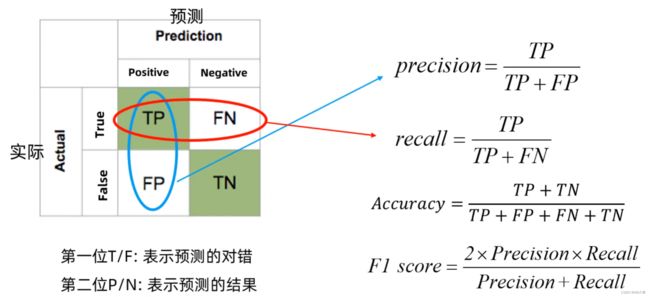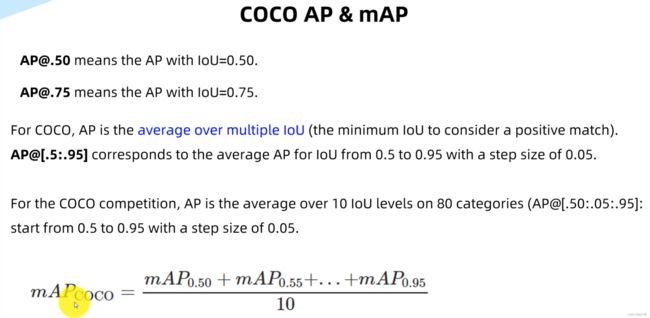YOLOv5基础知识点——性能指标
目标检测(object detection)=what + where
Localization+Recongnition
类别标签(category label)
置信度得分(confidence score)
最小外接矩形(bounding box)
定位是找到检测图像中带有一个给定标签的单个目标;
检测是寻找到图像中带有给定标签的所有目标
目标检测性能指标=检测精度+检测速度
检测精度
Precision,Recall,Fl score
IoU(Intersection over Union)
P-R curve (Precison-Recall cureve)
AP(Average Precision)
mAP(mean Average Precision)
检测速度
前传耗时
每秒帧数FPS(Frames Per Second)
浮点运算量(FLOPS)
混淆矩阵(confusion matrix)
对于边界框的分类用混淆矩阵衡量
精度precision (查准率)是评估预测的准不准(看预测列)
召回率Recall(查全率)是评估找的全不全(看实际行)
IoU(Intersection over Union)
边界框框的准不准用IoU来衡量
IoU=1 predicted and the ground-truth bounding boxes perfectly overlap.
you can set a threshold value(阈值) for the IoU to determine if the objext detection is valid or not.
Let‘s say you set IoU to 0.5,in that case:
if IoU≥0.5,-->True Positive(TP)
if IoU<0.5, it is a wring detection and classify it as False Positive(FP)
When a ground truth is present in the image and modell failed to detect the object, claasify it as False Negative(FN).
True Negative(TN):TN is every part of the image where we did not predict an object. This metrics is not useful for ibject detection, hence we ignore TN.
AP衡量的是学习出来的模型在每个类别上的好坏。
mAP衡量的是学出的模型在所有类别上的好坏。mAP就是取所有类别上AP的平均值。
IoU阈值越大,对检测框要求就越紧,recall召回率就相对小
AP(Average Precision)计算
AP计算之11点法
AP计算之积分法(Area under curve AU)
检测速度评估
前传耗时(ms):从输入一张图像到输出最终结果所消耗的时间,包括前处理耗时(如图像归一化)、网络前传耗时、后处理耗时(如非极大值抑制)
每秒帧数FPS(Frames Per Second):每秒钟能处理的图像数量
浮点运算量(FLOPS):处理一张图像所需要的浮点运算数量,跟具体软硬件没有关系,可以公平地比较不同算法之间的检测速度。
最适合新手入门的【YOLOV5目标实战】教程!基于Pytorch搭建YOLOV5目标检测平台!环境部署+项目实战(深度学习/计算机视觉)_哔哩哔哩_bilibili









